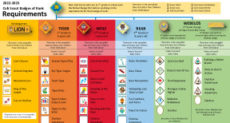 It’s said that there are three secrets to giving a presentation: Tell them what you’re going to tell them, tell them, and tell them what you told them.
It’s said that there are three secrets to giving a presentation: Tell them what you’re going to tell them, tell them, and tell them what you told them.
This approach is actually quite successful. You want to hook your audience with a taste of what’s to come before delving into the details of your message. You also want to make sure they don’t forget by summarizing what you just said at the end, in case their attention wandered during your talk – the too long, didn’t read version.
We’re heading into the time of year when our presentation teams are forming to fan out across our districts in the coming months to speak at courts of honor and Blue and Gold Banquets to try to convince the parents and families of our Scouts that Scouting is worthy of their financial support. Through Family Friends of Scouting, we ask for pledges of support to fund our local council’s camps, programs and services. Perhaps you are an FOS presenter, or a member of your unit committee responsible for coordinating your FOS participation.
Part of the process is for each presenter to formulate a message that will resonate with the units that they’ll speak to. There is usually a script provided by the council FOS committee, but veteran presenters usually wander off script and personalize their message.
These seasoned presenters know that you’ve got to tell them what you’re going to tell them in a convincing manner. They try to hook the audience’s attention in the first couple minutes, then tell them a convincing story framed in personal terms that the parents can understand or envision.
Most professional speakers follow the same pattern. Caitlin McGuire, content strategist for the consulting firm Ethos3, writes that the way to win your audience over is to start strong. The first two minutes can make or break your presentation. McGuire’s advice on making a splash can easily translate into the Scouting experience:
- Share a shocking statistic – You could offer some data on how much screen time kids today spend in their idle hours and how Scouting gets them out into the world beyond their iPhones. Or the success rate for Scouts in college and the work world compared to those who weren’t involved in Scouting. Whatever it is, it needs to be relevant and relatable.
- Start with a story – One of my most successful FOS presentations started with a story about how two brothers came to the rescue of an elderly neighbor who slipped on the ice, using their Scout skills to calm and comfort her until help arrived. I also tell stories about my sons and how they owe their success in life in part to the skills and leadership they learned as Boy Scouts. You most likely have similar stories to tell – something that made you stop and say “wow”.
- Paint a preferred future – We all want the best for our sons and daughters, and the opportunities afforded by Scouting can increase the odds of success. Unless Scouting prospers, our young people won’t have these advantages.
These formulas work well when making FOS presentations, usually more so than just sticking to the script. They also work regardless of what kind of presentation you are making – at work, church, school or club. Hook them at the outset and make a personal connection, and the audience can’t miss your message.
This post first appeared on Bobwhite Blather.




Dear Frank – What a great post to start the week with! Thank You!
Coincidentally just last Friday I shared this concept with my team at work. I conducted a workshop for my team in which i shared several of the tools that I learned at Woodbadge this summer.
Tell Them, Tell Them, Tell Them was one of them. I shared this tool as an intro to an EDGE excercise. What I love about these two tools is that they provide a framework for success. I actually think that Tell Them X3 can be incorporated into the “Explain” step when planning your presentations and training.
Thanks for connecting Tell Them X3 into the FOS preparation. I suspect most people are hesitant to volunteer to make the ask because they dont have a script. I encourage your readers to share this post with their Packs and Troops.
Yours in Scouting – JIM